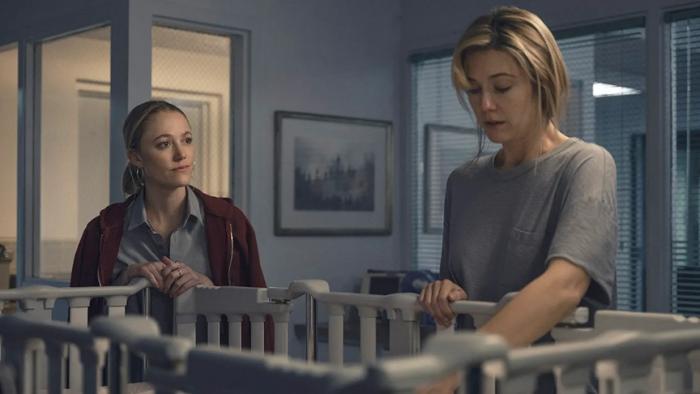By Kayleigh Donaldson | Film | October 27, 2025

Caitlyn Morales (Mary Elizabeth Winstead) is a hotshot lawyer working hard through her second pregnancy. Her latest case involves Polly (Maika Monroe), a young woman facing homelessness with nobody to rely on. After the birth of her new daughter, Caitlyn, overwhelmed and in need of help, asks Polly to be the nanny. It seems like the perfect arrangement, but now, things are going so very wrong …
In the era of legacy sequels and remakes, here comes The Hand That Rocks the Cradle, a pointless addition to the fold that loosely adapts the 1992 film directed by Curtis Hanson and starring Annabella Sciorra and Rebecca De Mornay. What made the original The Hand That Rocks the Cradle work was its balance of sinister and camp, as well as the way it played into many ideas and entertainment tropes that were prevalent at the time. It’s not exactly an erotic thriller, certainly not in the way something like Fatal Attraction was, but both films share a lot of DNA in regard to themes of ‘sinister’ women and the gendered backlash that had taken root in the ’80s and early ’90s. If Glenn Close was the embodiment of men’s fear over powerful professional women demanding more from men than their scraps, Rebecca De Mornay was the domestic invader who proved that no space was safe from the smog of misogyny.
This does make the movie sound classier and more important than it actually is. Make no mistake, The Hand That Rocks the Cradle is not great, and it’s definitely nowhere near as impactful as Fatal Attraction. But there is a potency to its story, as well as some of its more infamous scenes, that allowed it to linger in the imagination. Frankly, it was a good candidate for a remake: a good but not great film with potential for something beyond expectations and themes that could be expanded upon for a new generation. How do you take on fear of motherhood and the loss of feminine autonomy in 2025 when tradwives are back and the current administration is wielding a lot of legislative force in favour of pushing women back into the kitchen?
Well, in this case, you don’t really do anything of note. Director Michelle Garza Cervera does a perfectly competent job with a script that wants to be kinder to its antagonist but still make her a boo-hiss villain for at-home popcorn parties. There are moments of intensity and some sturdy filmmaking, yet it’s saddled with a real timidity of tone. By its ending, the entire thing is so self-serious that it loses all tension. It’s admirable that they wanted to remove the soapiness of the original film, yet it rings hollow because there’s no heft to these themes of motherhood and invasion. The potential left on the table from the original remains untouched with this remake.
But what this film does have going for it is a powerhouse performance by Mary Elizabeth Winstead. Often the best thing in many a bad movie, Winstead has been stealing scenes left and right in genre projects like 10 Cloverfield Lane and Birds of Prey. She hasn’t had a good fully dramatic movie role worthy of her since perhaps Smashed. Here, she is giving it her all as a woman wracked by guilt and facing down a cycle of gaslighting that has left her on the verge of shattering. But her performance also far outweighs that of Maika Monroe, another excellent and often underserved actress who struggles to find the right balance of appealing and sinister with Polly. She seems too obviously evil from an early stage and can’t make some unconvincing dialogue land with the necessary punch. We’ve no reason to believe, on the page or in the performances, why anyone would side with Polly over Caitlyn when the manipulations begin.
The sexual tension between the gay Polly and the bisexual Caitlyn is an intriguing addition, making for one of the film’s most striking scenes with a dinner party that quickly goes dark. Cervera’s direction and Micah Bloomberg’s script manage to pull this queering off without playing into any phobic tropes, which is a minor miracle given how much the erotic thriller genre was built upon crazed bisexuals with knives. Still, one wishes this film had made a sharper choice with its tone: go all in on hardcore psychological terror or play around with the theatrics of it all. Sitting on the fence leaves nobody truly satisfied.
It’s not even that The Hand That Rocks the Cradle is terrible. That would at least be something. It’s just another legacy remake that only exists because some executive was handed a folder full of the IPs their studio owned and went, ‘eh, why not this one?’ One wonders if the writer and director were even allowed to make bold choices. There’s a great film at the core of this project about a repressed bisexual woman who yearns for the love of someone whose intentions are broken. You can see smart ideas behind the project, but the execution only reveals how IP recycling rules the roost in Hollywood. At least we got a great performance out of it.
The Hand That Rocks the Cradle is now on Hulu.